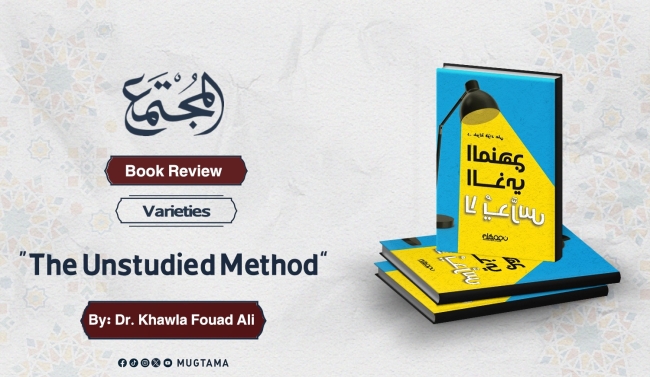Book Review: “The Unstudied Method” by Dr. Khawla Fouad Ali
Dr. Khawla Fouad Ali begins her introduction in the book "The Unstudied Method" by discussing the educational flaws in the current teaching system. She highlights the importance of adopting a method based on maturity and genuine awareness. Before delving into the methodology, she shares a glimpse of her personal journey and the lessons learned, helping readers understand her focus on this approach.
Modern-Day Challenges
The author describes the current era as riddled with chronic anxiety, stress, and fear of the future. Despite efforts in studying and planning, daily conflicts—whether internal or external—make it challenging to achieve balance.
The Foundation of the Method: Awareness
For the author, awareness goes beyond merely observing the world around us. It encompasses a profound understanding of one’s internal workings. She compares awareness to a muscle that strengthens with practice and weakens with neglect. To achieve the highest level of awareness, one must go through five stages, starting with observing thoughts without judgment and culminating in realizing that some thoughts are unproductive and drain energy.
The Core of the Method: Self-Worth
Achieving awareness requires understanding the ego, which is tied to our bodies and thoughts. The ego is fragile and shifts with circumstances, leaving it in a constant state of fear over losing its value. A lack of self-worth manifests in excessive perfectionism, undervaluing good work, and exaggerated guilt. To address this deficiency, Dr. Khawla suggests identifying the root cause of the problem and gaining life experience to build skills and confidence.
The Method’s Pitfalls: Anxiety and Stress
The pitfalls of the method are divided into two categories: journey-related challenges and interpersonal challenges. Acute anxiety stems from a recent issue, while chronic anxiety requires changing negative thoughts into positive ones. Sources of anxiety include seeing events as life-altering, fearing disappointment, and believing in a “sixth sense” that often stems from our fears.
Interpersonal Pitfalls: Competition and Comparison
Destructive comparisons are among the most significant interpersonal challenges, whereas healthy competition encourages growth. Comparisons lead to anxiety and stress because they stem from the misconception that everyone follows the same path to success. Bullying is another challenge, with the bully often being a weak individual seeking dominance. Dealing with bullying requires recognizing one’s self-worth and forgiving after understanding the bully’s vulnerabilities.
The Outcome of the Method: True Excellence
After laying the foundation—including self-awareness, self-worth, and overcoming life’s and interpersonal challenges—comes the phase of creativity and outward engagement. This stage relies on passion, skill, opportunity creation, and consistent effort. Passion is found in work that brings joy from start to finish, skills are developed through training and experience, and opportunities are created by studying the market and solving problems faced by businesses.
Conclusion
The Unstudied Method offers a comprehensive framework for addressing psychological and social challenges. It begins with developing self-awareness, addressing self-worth deficiencies, managing anxiety and stress, and fostering healthy interpersonal interactions. Through this book, Dr. Khawla Fouad Ali provides a roadmap to help individuals achieve excellence and creativity in their personal and professional lives.
-------------------------------------------------------------


